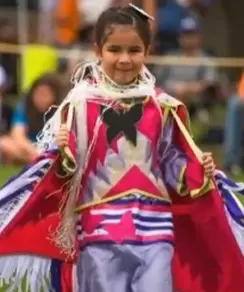“How can we live in ways that are joyful and thriving as opposed to just surviving?” Dr. Susan Faircloth posed this question at the opening of her presentation to students, staff, and faculty on October 10, 2023, at the College of Education at Illinois.
Dr. Faircloth was invited to speak on campus as part of the Dean’s Distinguished Speaker Series. Her talk was titled “Schol(her)ship as an Act of Resistance and Survivance: Reflections from an Indigenous (M)other-Scholar.”
In January of 2023, Dr. Faircloth stepped down from her job as the director of the School of Education at Colorado State University. She then took a semester-long leave of absence to determine her future.
Dr. Faircloth said she was in an unhealthy place and had experienced two health scares. Moreover, she felt a sense of “otherness” and did not feel supported as an Indigenous female scholar and leader, reaching a point of ‘just surviving’ in the academy without enacting honest changes that supported her ideals.
During her time off, she reflected on her role in academia and listened to her heart and mind. Prior to the start of the fall 2023 semester, she decided to leave the job she loved to save herself and “recreate who Susan is.”
During her time off, she reflected on her role in academia and listened to her heart and mind.
For many years, Dr. Faircloth “allowed the academy to tell her a different story” of who she was and wasn’t. She is now trying to find her purpose and joy by reclaiming and narrating accurate accounts of her beliefs, values, strengths, and resilience as an Indigenous woman, mother, and scholar. As part of Two Feathers Consulting LLC, Dr. Faircloth can now engage and serve communities and organizations more directly.
Dr. Faircloth is a member of the Coharie tribe of North Carolina. She became an academic scholar 23 years ago when taking the director position in the American Indian Leadership Program at Pennsylvania State University. She was a former participant in this program and earned her master’s degree and doctorate in special education and educational leadership, respectively.
Dr. Faircloth was the only Indigenous woman scholar while she held the director position and the first Indigenous woman to be promoted to tenure during the institution’s existence. While in higher education, Dr. Faircloth engaged in oral-history projects with tribal members who attended an Indian school in East Carolina. She has done extensive Indigenous-centered research nationally and internationally to help improve the education outcomes of Indigenous youth and the sociocultural conditions of Indigenous communities.
Thirteen years ago, Dr. Faircloth and her husband adopted an American Indian baby girl from Oklahoma who was Cheyenne and Arapaho. A year later, the family of three moved to Fort Collins, Colorado, to reunite her daughter with the ancestral homelands of her people. This move was tied to a leadership position she accepted at Colorado State University—an institution that rests on land that has forcefully displaced the Cheyenne, Arapaho, and Ute Nations.
Dr. Faircloth said her presence at the university was a contested relationship and that she wouldn’t have been able to do the work she has done if not for the removal of Indigenous peoples. She challenged the audience to “move beyond performative acts of land acknowledgements” and begin doing social justice projects with “the peoples whose land we live, learn, and work.”
Dr. Faircloth is one of the few courageous Indigenous scholars who has embraced a leadership role in higher education for numerous years. “Leadership is hard; it’s also heart work, and it’s not for the faint of heart,” she said. According to the National Center for Education Statistics (2023), less than one half of 1% of full-time faculty in the U.S. identify as American Indian or Alaska Native. Of this percentage, even fewer Indigenous faculty hold administrative positions. They often encounter challenges and isolation (Riley et al., 2023).
Dr. Faircloth has experienced her share of challenges and loneliness as an Indigenous female scholar-leader. But she also has important life and career lessons to share:
- Weave Indigenous knowledge with Western knowledge. Couple Indigenous ways of knowing and research sovereignty with Western research practices.
- Balance community engagement and peer-reviewed publication. Only focusing on getting published is “educational malpractice,” she said. Scholars’ work should impact education and communities positively.
- Give back and mentor. Give back through scholarship, service, and presence and mentor other Indigenous scholars.
- Understand that scholarship is an ethical and political act. Scholarship involves relationships, responsibilities, respect, persistence, transparency, and reciprocity.
- Be justice-oriented. Be cognizant of how to challenge others; practice authenticity; be self-aware of your own beliefs, values, and dispositions; and prioritize being person- and family-centered rather than organization- and system-centered.
These lessons and her stories serve as guiding principles for academic scholars and leaders to reimagine the work they do in the academy. Dr. Faircloth said to share authentic narratives to challenge dominant structures and ideologies. She added that stories can be used as a tool to survive, feel purpose, and live joyfully.
Watch a video of the talk
References
National Center for Education Statistics. (2023). Characteristics of postsecondary faculty. Conditions of Education. U.S. Department of Education, Institute of Education Science. Retrieved October 23, 2023, from https://nces.ed.gov/programs/coe/indicator/csc
Riley, L., Hulama, K., Ka’o, H., & Paolo, G. (2023). Wrangling the system: How tenure impacts Indigenous research. Environment and Planning F, 2(1-2), 38-55. https://doi.org/10.1177/26349825221142290
